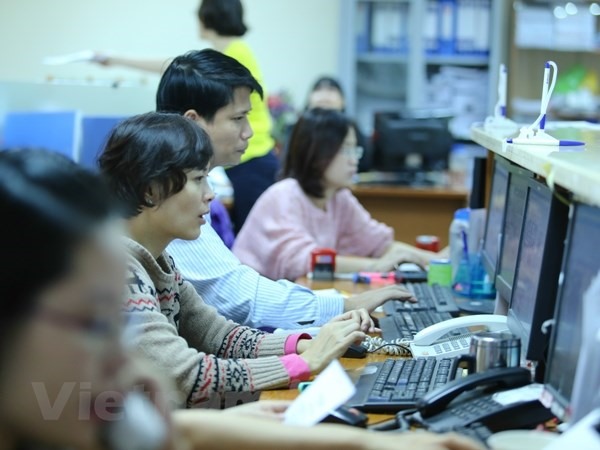 Economy
Economy

Large-cap stocks may be a better option for investors at the moment as earnings season is approaching and expectations will be better on large-cap companies thanks to their stable, consistent and less risky performances.
 |
| Large-cap stocks may be a better option for investors at the moment as earnings season is approaching and expectations will be better on large-cap companies thanks to their stable, consistent and less risky performances.— VNA/VNS Photo |
HÀ NỘI — Large-cap stocks may be a better option for investors at the moment as earnings season is approaching and expectations will be better on large-cap companies thanks to their stable, consistent and less risky performances.
Meanwhile, mid-cap and small-cap stocks, or speculative ones with a high degree of risk, would not be recommended.
Speculative stocks normally catch the eye of investors at the late stage of the market uptrend. At the moment, the Vietnamese stock market is on a recovery after having fallen sharply in December 2018, so large-cap stocks are more attractive, according to Ngô Quốc Hưng, an analyst at MB Securities Co.
Việt Nam’s benchmark VN-Index on the Hồ Chí Minh Stock Exchange gained 0.49 per cent on Friday to finish last week at a two-week high of 902.71 points. It totalled a weekly growth of 2.47 per cent.
The VN-Index increased by roughly 2.8 per cent from the six-month low of 878.22 points on January 3 after it had dropped total 8.64 per cent since December 12, 2018.
On the Hà Nội Stock Exchange, the HNX Index inched up 0.09 per cent to end last week at 101.87 points, totalling weekly growth of 1.01 per cent.
The northern market index has been in the same pattern with the VN-Index as it has gained total 1.34 per cent since January 3. The HNX Index lost 6.65 per cent between December 12, 2018 and January 3.
“Market trading liquidity is now depleted as investors are unwilling to bear the risks, so speculative stocks are not favoured at the moment,” Hưng told tinnhanhchungkhoan.vn.
According to Vietinbank Securities JSC, most individual investors are holding onto cash because of the coming Tet (Lunar New Year) holiday and their doubts over a strong recovery of the stock market following a rough year in 2018.
“It proves the stock market is quite sensitive and vulnerable to negative news while supportive macroeconomic news and earnings prospects have not boosted cautious sentiment.”
An average of 166 million shares was traded in each session of the last trading week, worth VNĐ3.3 trillion (US$141.7 million).
Last week’s trading figures were down 26.6 per cent in volume and 27.5 per cent in value compared to the pre-New Year holiday trading week.
Analyst Phạm Đức Hoàng at Agribank Securities Co (Agriseco) said speculative stocks would be less attractive than those that had been undervalued by the market overreaction to bad news.
According to the two analysts, speculative stocks should not top the priority list of investors as the earnings season has come and large-cap stocks, especially those undervalued large-caps, would likely beat their earnings expectations and become better investment targets.
The Joint Stock Commercial Bank for Foreign Trade of Vietnam (Vietcombank) and the Joint Stock Commercial Bank for Investment and Development of Vietnam (BIDV) have beat full-year earnings expectations.
Vietcombank is now the fourth largest listed business by market capitalisation with total market value of nearly VNĐ198.6 trillion. BIDV is the seventh with a market value of VNĐ109 trillion.
At the year-end meeting on Thursday, Vietcombank reported its full-year pre-tax profit was over VNĐ18.3 trillion, up 63 per cent year on year. A day earlier at a meeting, BIDV announced its total profit rose 13 per cent year on year but did not give further details.
The two banks’ official financial reports are expected to be released in the near future.
However, the stock market is having trouble out-performing the 900 point level in the short term despite good news from international markets, according to Agriseco analyst Hoàng.
“Market trading liquidity is low, proving investors are not optimistic about the market recovery and unwilling to purchase stocks.” — VNS




